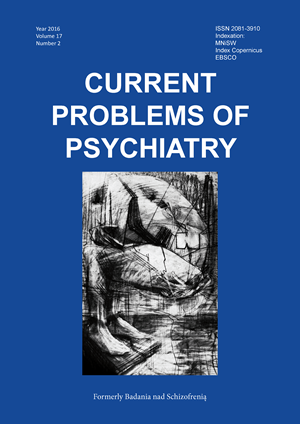Social competence and the need for approval and life satisfaction of women with excess body weight and women of normal weight - preliminary report
DOI:
https://doi.org/10.1515/cpp-2016-0013Słowa kluczowe:
life satisfaction, social competencies, the need for approval, excessive body weightAbstrakt
The purpose of the present study is to examine the life satisfaction levels in two groups of women - with excess body weight and nor-mal weight and the relationship between life satisfaction and the level of social competences The study involved 70 women (35 with excess body weight and 35 with normal weight). The Life Satisfaction Questionnaire, Social Competence Questionnaire and Social Ap-proval Questionnaire were used in the study. The study revealed no significant differences in terms of overall life satisfaction among women with excess weight and normal weight and a number of other relationships between the variables (like the importance of the need for social approval for the assessment of life satisfaction in those who have excess body weight).
Bibliografia
1. Łuszczyńska A. Nadwaga i otyłość. Interwencje psychologiczne. Warszaw; PWN: 2007.
2. World Health Organization http://www.who.int/mediacentre /factsheets/fs311/en/.
3. Ogińska-Bulik N. Psychologia nadmiernego jedzenia. Łódź; Wy-dawnictwo Uniwersytetu Łódzkiego: 2004.
4. Brytek-Matera A. Obraz własnego ciała u otyłych kobiet: przyczyny i stopień niezadowolenia, związek z obniżoną samooceną i strategiami radzenia sobie ze stresem. Psych. Pol. 2010; 44 (2): 267-275.
5. Zerr P. Surpoids et obésité de l’adulte : prise en charge médicale de premier recours. Le Collège de la Haute Autorité de Santé, Saint-Denis La Plaine: 2011.
6. Chanduszko-Salska J, Chodkiewicz J. Zadowolenie z życia a po-czucie własnej skuteczności, wsparcie społeczne oraz stan zdro-wia u kobiet z nadwagą i otyłością. Endokr, Otyłość i Zab Przem Mat. 2010; 6 (4), 171-178.
7. Głębocka A., Szarzyńska M.: Stereotypy dotyczące osób otyłych a jakość życia ludzi w starszym wieku. Gerontol. Pol.; 2005;14 (4):, 260-265.
8. Carr D., Friedman M. Body Weight and the Quality of Interpersonal relationships. Soc Psychol Q. 2006;69,127-49
9. Granberg E. Now my ‘old self’ is thin. Stigma Exits after Weight Loss. Social Psychology Quarterly 2011; 74 (1): 29-52.
10. Schafer M., Ferrarol K. The Stigma of Obesity. Does Perceived Weight Discrimination Affect Identity and Physical Health? Soc Psych 2011; 74 (1): 76-97.
11. Friedman K.E., Reichmann S.K., Comstanzo P.R. Zelli A., Ashmore J., Musant G.: Weight stigmatization and ideological beliefs: rela-tion to psychological functioning in obese adults. Obes. Res.2005; 13 (5): 907-916.
12. Grzesiuk K. Psychologiczne aspekty otyłości. W: Janowski K., Artymiak M. red.., Człowiek chory – aspekty biopsychospołecznej. Lublin; Cen-trum Edukacji i Pomocy Psychologicznej: 2009; s. 313-335.
13. Bishop G. D. Psychologia zdrowia. Wrocław; Wydawnictwo ASTRUM: 2010.
14. Kushner R..F., Foster G.D.: Obesity and Quality of Life. Nutrition, 2010, 16 (10): 947-952.
15. Kolotkin R.L., Crosby R.D., Williams G.R., Rhys W., Hartley G., Nicol S.: The relationship between health-related quality of life and weight loss. Obes. Res.,2001; 9 (9): 564-571.
16. Wadden T.A., Phelan, S.: Assessment of quality of life in obese individuals. Obes. Res. 2002; 10 Suppl 1: 50S-7S.
17. Williamson, D.A. i O'Neil, P.F. Obesity and Quality of Life. W: Bray G.A., Bouchard C. red. , Handbook of obesity. Etiology and Pathophysiology. New York; Marcel Dekker: 2004, p. 1005-1028.
18. Fontaine K.R., Barofsky J., Cheskin L.J. Predictors of quality of life for obese persons. J Nerv Ment Dis, 1997;185(2): 120-122.
19. Gnacińska-Szymańska, M., Dardzińska, J. A., Majkowicz, M. i Małgorzewicz, S.:Ocena jakości życia osób z nadmierna masą ciała za pomocą formularza WHOQOL-BREF. . Endokr., Otyłość i Zab Przem Mat. 2012; 8 (4): 136-142.
20. Sola M., Gajewska E., Manikowski, W. Wpływ otyłości na jakość życia związaną ze stanem zdrowia wśród dziewcząt i chłopców. Now. Lek. 2012; 81(4): 321–329.
21. Radoszewska J. Problem otyłości w psychologii klinicznej. Nowi-ny Psychologiczne 2003; 3: 23-31.
22. Zubrzycka E. Apetyt na zdrowie. Mity na temat nadwagi. Gdańsk; Gdańskie Wydawnictwo Psychologiczn :2007
23. Doliński D. Wpływ społeczny a jakość życia. Psychologia Jakości Życia 2002; 1: 35-52.
24. Carr D., Friedman M.:“Is Obesity Stigmatizing? Body Weight, Perceived Discrimination, and Psychological Well-Being in the United States.” J Health Socl Behav 2005; 46: 244–59.
25. Chodkiewicz, J.: Adaptacja polska Kwestionariusza Zadowolenia z Życia FLZ. Studia Psychologiczne 2009; 47 (3): 5-21.
26. Fahrenberg J., Myrtek M. Schumacher, J., Brähler E. Fragebogen zur Lebenszufriedenheit. Göttingen; Hogrefe-Verlag: 2000.
27. Matczak A. Kwestionariusz Kompetencji Społecznych. Podręcz-nik. Warszawa; Pracownia Testów Psychologicznych Polskiego Towarzystwa Psychologicznego: 2001.
28. Drwal R. Ł., Wilczyńska J. T.: Opracowanie Kwestionariusza Aprobaty Społecznej. Przegląd Psychologiczny, 1980; 23 (3): 569-583.
29. Tatoń J., Czech A., Bernas M. Otyłość zespół metaboliczny. Warszawa; Wydawnictwo Lekarskie PZWL: 2007.
30. Puh, R., Heuer C.: The Stigma of Obesity: A Review and Update. Obes. 2009; 17 (5): 941–964.
31. Puhl R., Heuer C.: Obesity Stigma: Important Considerations for Public Health. Am. J. Public Health 2010;100 (6): 1019-1028.
32. Bąk-Sosnowska M., Zahorska-Markiewicz B., Mandal E. Trzcieniecka-Green A.: Poziom lęku oraz poczucie kontroli u kobiet decydujących się na rozpoczęcie kuracji odchudzającej. Psychiatr Pol, 2006; 40 (1): 99-107.
Pobrania
Opublikowane
Numer
Dział
Licencja
Prawa autorskie (c) 2016 Autorzy

Praca jest udostępniana na licencji Creative Commons Attribution-NonCommercial-NoDerivatives 3.0 Unported License.


